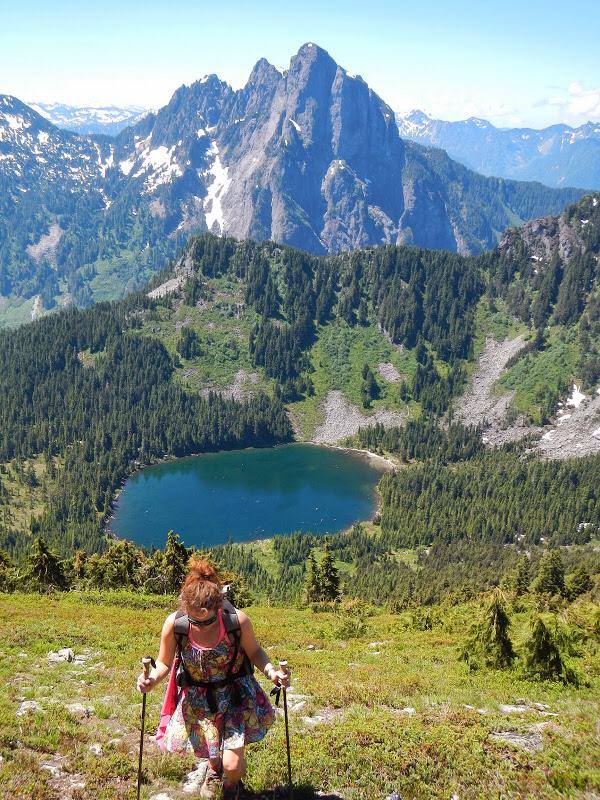Cooler? Check. Air mattress? Check. Massive six-person tent? Check. You’ve got this car camping thing down. Maybe it’s time to explore the next frontier: backpacking.
You’ll eat, sleep and live in wilderness that was inaccessible before, and the glow of accomplishment you’ll feel after spending a night in the deep woods will burn for days.

Selecting a Destination
In a perfect world, you’d already have outdoorsy friends that have offered to take you on your first overnight. If this isn’t the case, ask your experienced neighbor, coworker, family member or friend for recommendations on where to go based on the season and your ability.
Record-breaking through-hiker Heather Anderson (known as Anish on the trail) recently chatted with me about the importance of not biting off more than you can chew.
“Plan according to your abilities,” said Anderson. “Most people average about 2 mph on fairly level terrain. Don’t pick an itinerary that’s too aggressive.” Anderson suggests checking with your local hiking groups, your outdoor store (e.g., REI) or local agencies such as the National Park Service.
A two-day, one night trip where you cover 5-10 miles of trail each day is a great starting point. Obviously, bring a friend for your first big hike. For an overnight or weekend trip, a 50-liter pack will suffice. As a rule, your pack weight shouldn’t exceed 30 percent of your body weight.
“You don’t need a huge pack for most trips,” said Anderson. “Buy a pack that’s big enough for your essential items. If there’s empty space in your pack, you will fill it. For reference, I can carry six days with a bear can in a 3,200 cu/in (52 liter) pack.”
Your Backpack and Rations
Since you’ll be carrying your shelter and food on your back, choosing a comfortable pack is key. The weight of the pack should rest on your hips, so get fitted for a pack with the appropriate torso length. If you’re not ready to buy, you can rent a pack at select REI stores.
Dehydrated food is lighter than regular food, so pick up some ready-to-go meals to heat up on the stove.
As for water, it’s unlikely that you’ll be able to carry all you need for the entire trip. Therefore, make sure that there is a water source near your destination when you’re planning your route. To be safe, set out with at least two liters of water, and bring the necessary equipment—purification pump or tablets—to clean the water at its source. It’s a good idea to start your hike hydrated. So, drink a liter of water before you set off.
Essential Gear for Making Camp
Go light! You don’t need anything bigger than a 2- or 3-person tent which you can break down and share between two packs. When selecting a campsite, look for relatively dry, flat ground away from wobbly, dying trees.
Unless you’re a diehard, a three-season down sleeping bag will suit you just fine. Down is lighter and more packable than synthetics. Adding a sleeping pad will keep you warmer and more comfortable.
Depending on the season, you might not be able to build a fire at camp. So, you’ll need a stove to heat up your water for your meals.
Finally, bring a headlamp or flashlight and extra batteries. A small first aid pack with bandages and moleskin for blisters can also come in handy. Take a look at The Ten Essentials.
Dress for Success
Layer up for comfort and warmth. Leave the cotton t-shirts at home; stick to moisture-wicking, quick-drying fabrics. Your back will get sweaty fast. Stash a rain jacket and maybe a down puffy in your pack.
Ultimately, your most important gear is your hiking boots. You’ll want broken-in, waterproof, mid-cut boots. Comfort trumps all. Most likely, the boots you’ve been wearing for day hikes will work just fine for a short trip.
Understand Outdoor Ethics
The non-profit organization Leave No Trace lists seven principles that will help you enjoy the outdoors responsibly: plan ahead and prepare, travel and camp on durable surfaces, dispose of waste properly, leave what you find, minimize campfire impacts, respect wildlife, and be considerate of other visitors. Leave the wilderness just as pristine as you found it.
So, next time you camp, step beyond the parking lot and explore a new world in the wild!
Photo credit: Adam Walker.
